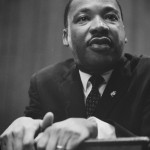In my ninth grade Social Studies class I wrote a paper arguing that abortion should not be legal in the US. It was Spring 1979 – just six years after the Supreme Court’s Roe v. Wade decision. I was 15 and had grown up as a Christian. That God was “pro-life” seemed prima facie long before I knew what that Latin phrase meant. After all, wasn’t “thou shalt not kill” one of His Top Ten rules for living?
But there was a problem: The more I researched constitutional law, the harder it was to find a compelling legal argument to overturn Roe v. Wade, much less to adopt a constitutional amendment banning abortion.
That paper forced me into the dilemma of arguing for a law that fit my faith, but not my citizenship. It was one of my earliest shifts away from a black-and-white, right-and-wrong mindset.
Last week, the ugly reality of our nation’s ongoing struggle with race again came to the forefront. The facts in the incidents are more than any of us will ever know or comprehend, but that won’t stop most of us (me included) from forming uninformed opinions. Just take a glance at social media and you’ll see what I mean.
Black lives matter. Police lives matter. White lives matter.
Babies’ lives matter. Women’s lives matter.
All lives matter.
Well, of course. But when we hear one of those lines—Black lives matter. Women’s lives matter—and respond with another—All lives matter. Babies’ lives matter.—we’re just using our mouths instead of our ears… our heads, not our hearts. We’re not listening.
When I was writing that abortion paper, I learned about something else that matters: words. You see, I called myself pro-life, but people on the other side called me anti-abortion; they were pro-choice, but my side would call them pro-death. We said we cared about life, yet too often showed little concern for the life of the mother; they said they cared about the woman, yet showed no concern for the life—or even potential life—growing inside her. It was a war of words.
“Black lives matter” began as a rallying cry but turned into a movement. Like a lot of movements, it’s not all simple and pure. (Didn’t the non-violent civil rights movement of Martin Luther King, Jr., in some way spur some of the violent actions of the time – even while not condoning the violence?)
Whatever you think of the movement, the words themselves matter: black lives matter. And, with help, I found that when I would respond to that cry with a trite, “all lives matter,” I was only proving that black words didn’t matter to me. And that meant something needed to change: me.
Saying “black lives matter” shouldn’t just mean that cops need to stop killing black people.
Saying I’m “pro-life” shouldn’t just mean that we need to stop killing babies.
If lives matter…if life matters…then we should value those lives, their worth, their joys, their pains, their struggles…. If words matter, then maybe we need to start listening to them.


 Several months ago I read
Several months ago I read